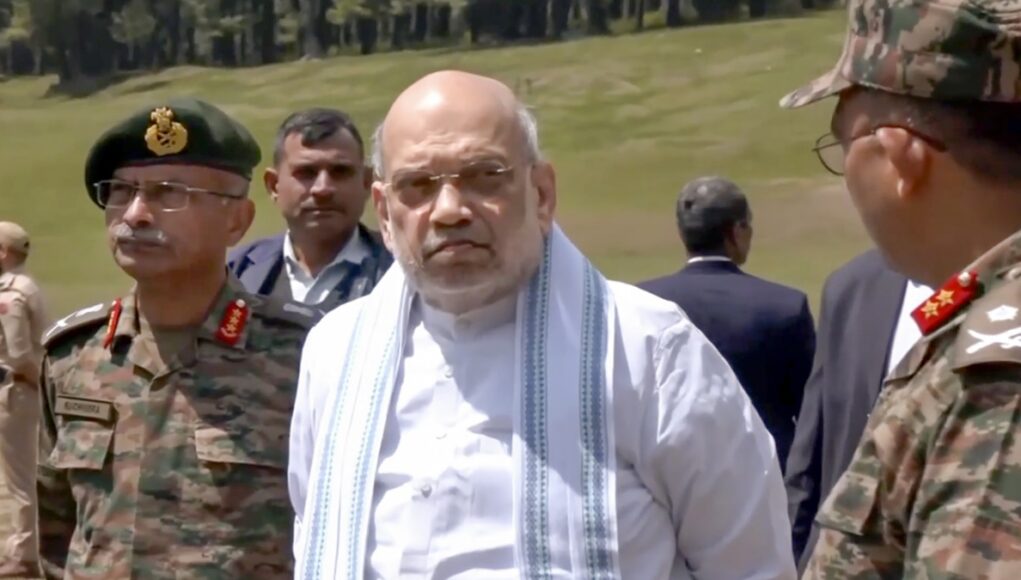Source : INDIATV NEWS
India on Thursday formally informed Pakistan that the Indus Waters Treaty will be held in abeyance with immediate effect. The decision came as a repercussion of the terrorist attack in Pahalgam.
Union Home Minister Amit Shah will hold a meeting today, on Friday, to deliberate on the future course of action regarding the 1960 Indus Waters Treaty with Pakistan, which has been put on hold. Sources told PTI that Union Jal Shakti Minister C R Paatil, along with senior officials from various ministries, will participate in the meeting.
The discussions will focus on the next course of action and how to implement the decision of keeping the treaty in abeyance, sources added. India has already notified Pakistan about its decision to keep the Indus Waters Treaty in abeyance with immediate effect, citing Pakistan’s violation of the treaty’s terms.
India informed Pakistan regarding the suspension
India’s Water Resources Secretary Debashree Mukherjee wrote a letter, addressing her Pakistani counterpart, Syed Ali Murtaza, that sustained cross-border terrorism by Pakistan targeting Jammu and Kashmir impedes India’s rights under the Indus Waters Treaty. “The obligation to honour a treaty in good faith is fundamental to a treaty. However, what we have seen instead is sustained cross-border terrorism by Pakistan targeting the Indian Union Territory of Jammu and Kashmir,” the letter read.
The decades-old treaty is suspended by India following the henious terror attack in Pahalga,m that resulted in massacre of 26 people, mostly tourists, on Tuesday. “The resulting security uncertainties have directly impeded India’s full utilisation of its rights under the treaty,” the letter read.
The communication to Pakistan also highlighted “significantly altered population demographics, the need to accelerate the development of clean energy, and other changes” as reasons necessitating a re-assessment of the treaty’s obligations. To give effect to the decision, the government has also formally issued a notification to suspend the Indus Water Treaty.
Indus Waters Treaty
The treaty brokered by the World Bank has governed the distribution and use of the Indus river and its tributaries between India and Pakistan since 1960. The Indus river system comprises the main river, the Indus, and its tributaries. The Ravi, Beas, Sutlej, Jhelum and Chenab are its left-bank tributaries, while the Kabul river, a right-bank tributary, does not flow through Indian territory.
The Ravi, Beas and Sutlej are collectively referred to as the eastern rivers, while the Indus, Jhelum and Chenab are known as the western rivers. The water of this river system are crucial to both India and Pakistan. At the time of Independence, the boundary demarcation between the two newly-formed nations — India and Pakistan — cut through the Indus Basin, leaving India as the upper riparian and Pakistan as the lower riparian state.
Two key irrigation works — one at Madhopur on the Ravi and another at Ferozepur on the Sutlej — on which Punjab on Pakistan’s side was entirely dependent, ended up within the Indian territory. This led to a dispute between the two countries over the utilisation of irrigation water from the existing infrastructure.
Following negotiations facilitated by the International Bank for Reconstruction and Development (now part of the World Bank Group), the Indus Waters Treaty was signed in 1960. Under the treaty, India was granted exclusive rights to the water of the eastern rivers– the Sutlej, Beas, and Ravi — amounting to an average annual flow of about 33 million acre-feet (MAF).
The water of the western rivers — Indus, Jhelum and Chenab — amounting to an average annual flow of around 135 MAF was largely allocated to Pakistan. However, the treaty allowed India to utilise the water of the western rivers for domestic needs, non-consumptive uses, agriculture and hydroelectric power generation.
On Wednesday, India announced a barrage of measures against Pakistan, including the suspension of the Indus Waters Treaty, expulsion of Pakistani military attaches and the immediate shutting down of the Attari land-transit post. Pakistan has rejected India’s suspension of the treaty and said any measures to stop the flow of water “belonging to Pakistan” under the pact will be seen as an “act of war”.
(PTI inputs)






